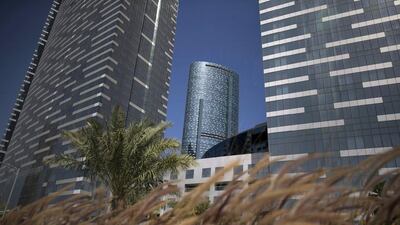Inflation in Abu Dhabi edged up to a six-year high last month as the effect of rent rises is finally reflected in official figures.
Prices in the capital rose 5.3 per cent in March against the previous year, according to Reuters calculations, driven almost entirely by rising housing costs. This is the highest rate of price increase since 2009 – the height of the UAE’s property boom.
The rise in the rate of inflation comes after prices dipped month on month in February.
Data released by Statistics Centre Abu Dhabi (Scad) on Thursday showed that the prices had risen 0.8 per cent in March compared to the month before.
“In Abu Dhabi, landlords saw an opportunity to hike rents in the wake of the removal of the rent cap,” said Jason Tuvey, an emerging markets economist at Capital Economics. “Strong growth in the non-oil sector has also increased population pressures.”
Rent increases were highest for the lowest earners in the city, at 16.8 per cent year on year. Their costs have risen by 7 percentage points more than for the top 20 per cent of earners, according to government figures.
Rent increases for Emiratis have also been slower than those for expats, the data shows.
Countrywide, inflation stood at 4.3 per cent in March – with rent costs up 9 per cent across the UAE against the previous year, and up 2.3 per cent against the previous month, according to the National Bureau of Statistics.
During the first quarter of 2015, inflation increases across the UAE were driven exclusively by housing cost increases, said Alp Eke, senior economist at National Bank of Abu Dhabi.
The effect of the removal of the rent cap in Abu Dhabi at the end of 2013 is only just being felt in inflation figures, economists said.
That is because the sample of housing used by Scad is weighted towards older properties.
Despite most households experiencing major rent increases, contracts expire and are renewed progressively throughout the year, spreading the effect of price hikes over a 12-month period.
“It always takes a while for policy changes to filter through,” said Mr Tuvey.
This week brokers warned that tenants in Abu Dhabi are likely to face further rent rises as the level of new housing supply falls to its lowest since 2009.
In Dubai, the rate of housing cost increases slowed last month, rising 0.2 of a percentage point in March – compared to an increase of 0.6 of a point in February.
This is the latest piece of evidence suggesting that rent rises are slowing in Dubai, as the real estate consultancy JLL predicts that rental costs could fall by as much as 10 per cent in the emirate by the end of the year.
“There are signs from Dubai that inflation is easing there, and that seems to reflect the fact that the property market is experiencing a bit of a downturn, which is feeding through to slower rises in rent,” Mr Tuvey said.
Across the UAE, food prices continued to decline in March, as low global agricultural commodities prices and a strengthening dollar cut supermarket bills for residents.
The United Nations Food and Agricultural Organization food price index is at a five-year low, while the dirham has appreciated by about a fifth against a basket of major international currencies, according to data from Bloomberg.
Despite falling food prices, increasing rents have meant that the cost of living has increased for many – and wages have only just kept pace, according to the recruitment agency Hays.
“In terms of salary expectations, there are clear distinctions between companies, who expected to offer pay increases of 3 per cent to 5 per cent, and candidates who expect increases of between 10 to 15 per cent,” said Christopher Greaves, managing director of Hays.
“Employers are cost-conscious, and won’t go splashing the cash on above-inflation salary rises,” he said.
“There’s a pent-up expectation this year among employees that they will get bigger pay rises. There’s definitely some tension between employees and employers.”
abouyamourn@thenational.ae
Follow The National's Business section on Twitter

